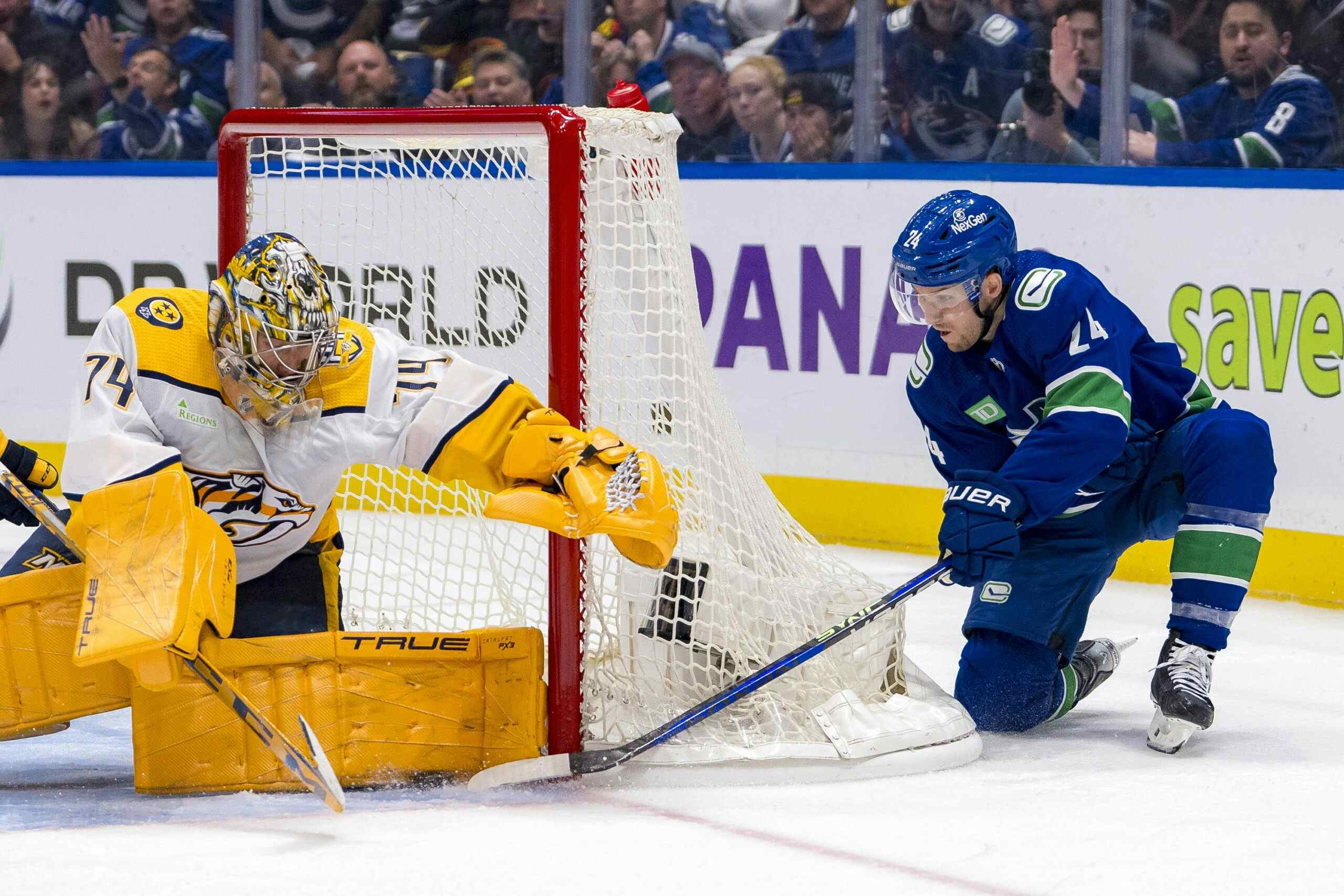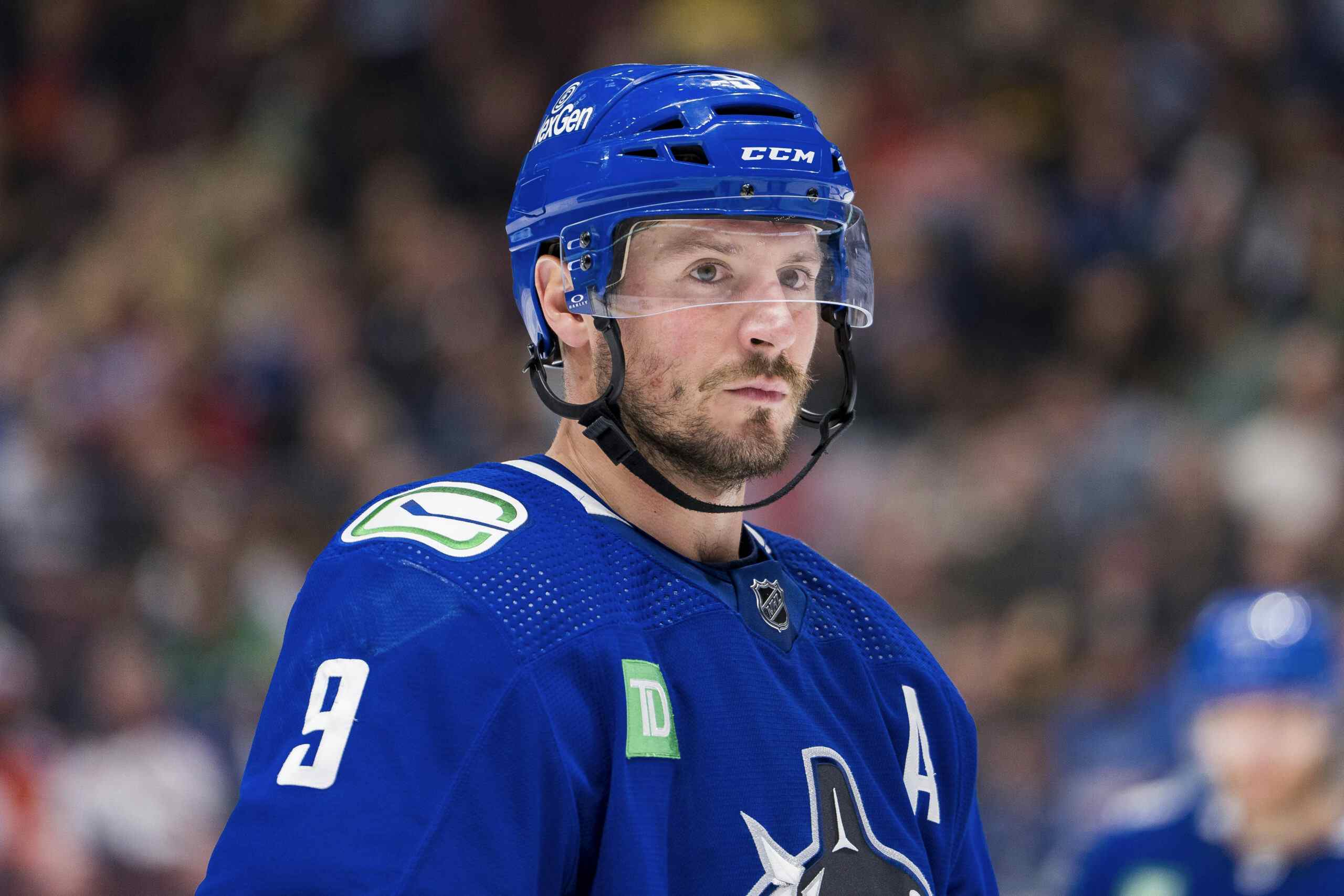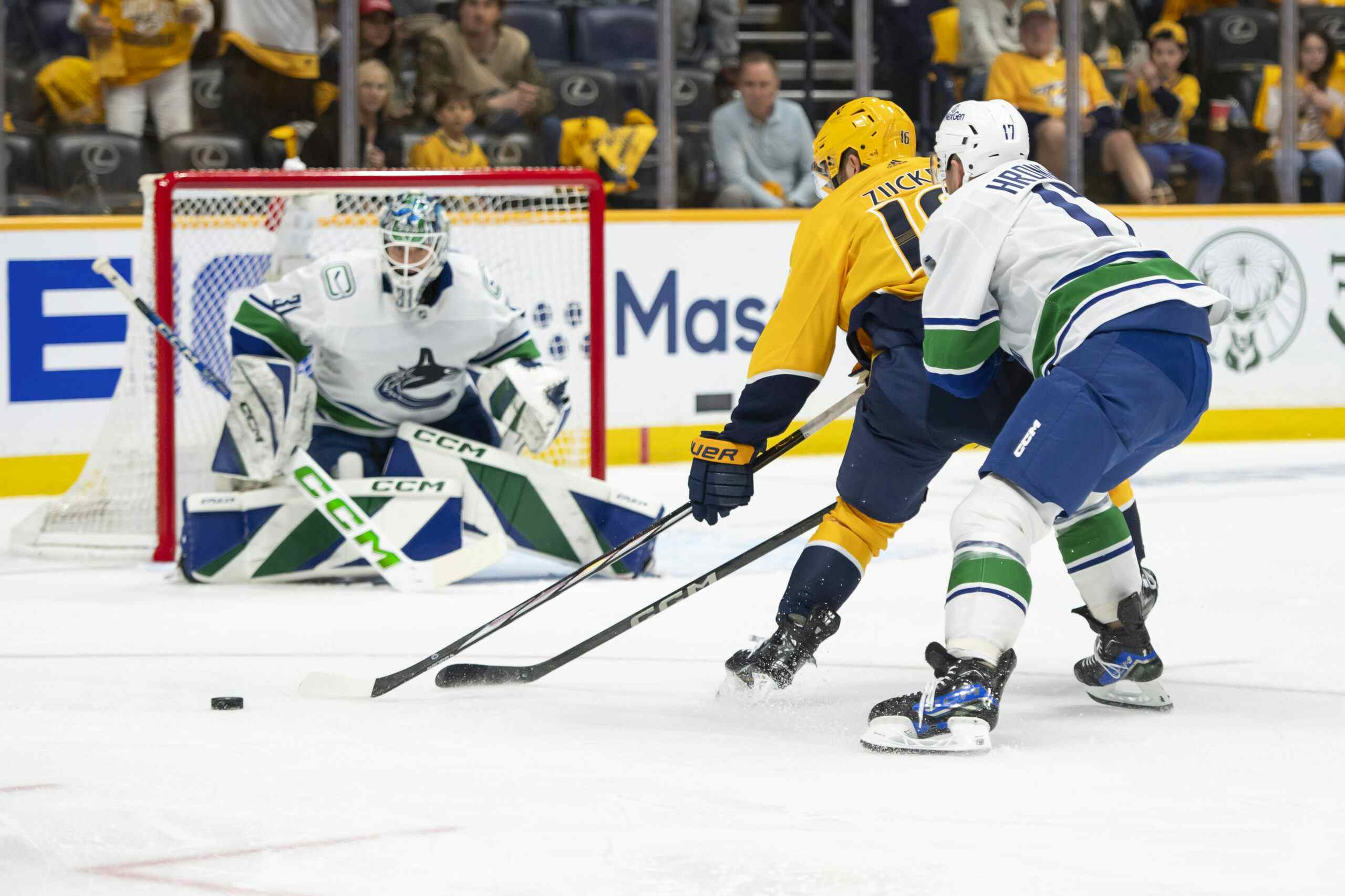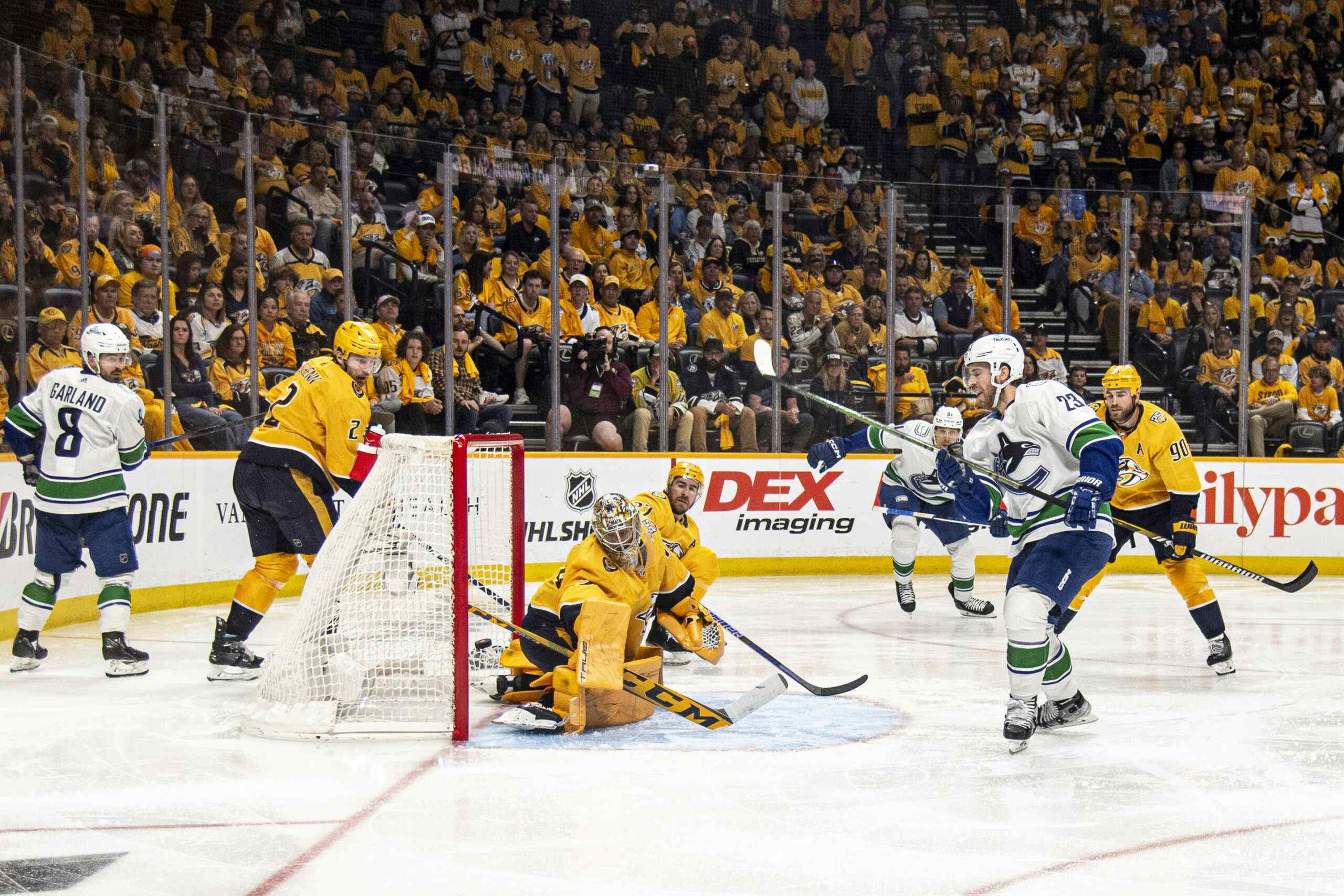Mailbag Part 2: Quinn Hughes, Prospect Targets, and the Truth About Canucks Twitter

5 years ago
I’m going to lump these two questions together since they’re very similar. I think it’s about 50/50 at the moment, but if Quinn Hughes comes in and really lights things up it could be enough to keep the wolves at bay for awhile. My gut tells me there’s no way Jim Benning can survive another losing season after this one, but I’m not quite sure how long the leash is at the moment. My best guess is that if Francesco Aquilini does decide to move on, it will be at the end of the season.
This question was obviously asked before the Canucks announced they had signed Josh Teves, but I think that addition makes any more signings pretty unlikely. In this instance, I don’t think there’s really enough there to justify taking up the contract slot. I’m not an expert scout by any means but there’s nothing about Lukosevicius that screams “future NHL regular” to me.
I think Lockwood basically holds all the cards in this scenario. It sounds like for him, the decision is mainly between turning pro and finishing college. I think if burning the first year of his ELC was a huge concern he’d have signed by now, so I won’t really be surprised if he either doesn’t sign until the NHL season is over or if he returns to Michigan. I’m certainly not against Utica signing him to an ATO but I haven’t heard it discussed as an option so I’m going to assume it’s unlikely at this point.
I’m feeling much better, thanks.
I think they have about as good a shot as anyone else, but it’s going to come down to money. The Canucks are probably going to have to pay him more than a contending team, or a team in a world-class city, or a team in a state with no income tax. So, you might say they’re at bit of a disadvantage. It’s within the realm of possibility but I definitely wouldn’t consider them to be a front-runner.
It’s a good bit, but I don’t think Derrick Pouliot is uniquely bad. Is he an NHL defender? I lean towards no, but there are lots of other defenders in the league who are struggling, and he isn’t the worst among them. Hell, he wasn’t even the worst defender on the Canucks until a couple of weeks ago.
I feel like Adam Gaudette is essentially the 13th forward in a healthy lineup until he really proves he deserves a spot. In the event that they need to free up another spot, I could see Markus Granlund or Nikolay Goldobin coming out of the lineup; but to be honest I’ll believe the Canucks have a full complement of NHL forwards when I see it.
Stranger things have happened. It seems odd to me that he would be the guy given Thomas Gradin’s history and the nature of his position within the club; but it seems even weirder that they’d make it all up as some sort of conspiracy to make Ron Delorme better, so I guess I believe it.
I think it’s a failure because all the losing hasn’t been in service of any real overarching goal. They’ve just been bad and lost a lot of games. If I felt really confident about the way players like Nikolay Goldobin, or Adam Gaudette, or any of the bevy of young players in Utica were developing, then maybe I could see the season as a success. Or if the Canucks made even one legitimate “rebuild trade”, selling off a veteran for futures, but that hasn’t happened. Instead, they basically tried to be competitive in a really bad Western Conference and failed. I’m not seeing a ton of positives (other than Elias Pettersson’s fantastic rookie season, but to be honest I expected him to be fantastic regardless of how the rest of the team performed).
Obviously I don’t have the time or the means to give a really in-depth answer to this question, but I’ll do my best to give a general overview. I think you need to put a lot of resources into the tracking the data, but more importantly you have to put it to good use. Having a diverse panel of consultants to interpret the data is probably the single most important element of incorporating it, including having people around whose job is to pinpoint what the limitations of the data are, and how the numbers might be lying to you. Ideally, I would want my analytics department to be made up at least in part by people who can look at tape and identify what processes are leading to better underlying numbers and what the players and coaching staff can do to put those processes into action.
The big market inefficiency right now pertaining to analytics as I see it is in amateur scouting. There is such a limited amount of data available on draft-eligible players in the public sphere. If I had unlimited money and resources my first priority would be getting eyes on every major league that supplies talent to the NHL and tracking as much data as possible on them. It’s crazy that in this day and age we don’t even know what a prospect’s shot rate is in his draft year in many cases. It would seem to me that the first team that’s really able to determine which players are legitimately driving play at the junior level beyond simple boxcar stats is going to have a huge competitive advantage at the draft table.
I think his injury might keep him out of action long enough to make any questions about the expansion draft irrelevant. If he’s completely good to go, I wouldn’t be surprised if the organization plays him in every game he’s eligible to play in, but I have a feeling it may be beyond their control regardless of what their plan for him is.
I guess it would have to be Olli Juolevi. As a side note, this is a great example of why grading a prospect pool in its totality is a pointless exercise. Who qualifies as a prospect changes so quickly that it basically doesn’t tell us anything.
I’ve been somewhat suspicious of how much patience Francesco Aquilini has had with the current regime, but it’s equally possible that he’s just trying to be mindful of the fact that he’s perceived as an overly meddlesome owner. I think he’d prefer not to add fuel to the fire and that may be why he’s been more patient than many would have expected.
It should be obvious. The Canucks are going to have the opportunity to protect more players in the expansion draft if they don’t give Hughes more than ten games, and more protected slots is better. It’s not an especially complicated argument.
To be honest I haven’t been able to pay as close attention to the draft this year as I have in the past, and it seems as though there’s still a lack of consensus around who are the best prospects after Jack Hughes and Kaapo Kakko, so I can’t really say who is going to realistically be there in the 5-9 slot.
I would say that after Hughes and Kakko, I think there’s a second tier of talent that includes Dylan Cozens, Kirby Dach, Peyton Krebs, and Bowen Byram, and then a third tier that includes a wider list of players like Ryan Suzuki, Matthew Boldy, Vasili Podkolzin, Alex Newhook, Cole Caufield, Trevor Zegras, Arthur Kaliyev, Alex Turcotte, and Raphael Lavoie. I haven’t really reached the point where I feel comfortable differentiating between individual players in those tiers and likely won’t be until the season is over, but based on my answer I think you can guess who the ideal candidates are. Obviously, if the Canucks miss out on the lottery, drafting one of Cozens, Byram, Dach, or Krebs would be the ideal scenario.
I get this question a lot and I could honestly go either way. Given that they’re currently edging close to the contract limit after signing Josh Teves, I’m leaning towards no, but only mildly so. Whatever they choose to do, it won’t come as a great surprise to me.
I think it’s more likely that Francesco Aquilini will just clean house when the time comes.
If it looks like Hughes is going to play that eleventh game, ownership should step in and veto the decision. That doesn’t necessarily mean taking a scorched-earth approach and firing everyone involved, but the option of losing that extra protected slot in the expansion draft shouldn’t be on the table.
To be honest, I basically don’t game. I could get all fire-and-brimstone about why, and get on my high horse about how I think gaming is a net negative for modern society, but to be honest it’s mostly just that I have to many other interests and not enough time or money to pursue another hobby. I have an old N64 I play sometimes and beat Super Mario 64 to 100% completion in the spring, but haven’t touched it since then. If I had an opportunity to score some more cheap used games I’d probably take the opportunity but it hasn’t come up. As far as recent games go, RDR2 looks cool, but I don’t really keep up with what the kids are into these days. Sorry I’m such an old man.
I don’t keep up with the European hockey leagues very well so I’m going to lean very heavily on Cam Robinson’s piece for Dobber Prospects on this subject. Besides Oliwer Kaski, he pinpointed Ilya Mikheyev and Otto Leskinen as having the highest upside. Taking a cursory glance at things like age, role, league, team, and production, I’d add Vladimir Tkachyov, Jacob Lilja, Ville Leskinen, and Teemu Turunen to the list of players who might be worth a look. You can check out his piece here.
I would say that it’s average or even better than average, but I also think that you have to be careful about where that logic takes you. The logical conclusion to most of the discourse around draft pick value is that you should basically trade every pick after the first round for a below-average NHL player because on average, you’ll be getting more value. There will be plenty of instances where you’ll be right, but you’ll just end up with a glut of below-average NHLers and not much to show for it.
The reason some people really harp on the organization for not acquiring or even just keeping their own draft picks is because of where the organization has been at over the past 5 years. They were never really in a position to compete, so what would have made the most sense would have been for the organization to acquire a bunch of lottery tickets and hope they hit the jackpot. It’s true that most second or third-round picks don’t become elite players, but at least if you actually hit on the pick you’ll make you’ll be getting the player’s best years when the team is ready to compete again, rather than a few years of Andrey Pedan mucking things up for 10-20 games a season while the team flounders at the bottom of the standings.
I think in the cases of Baertschi and Vey, there was enough there to justify taking the risk, but it’s honestly hard to make the case that they were better off taking a chance on Pedan/Pouliot/Larsen/Etem rather than just keeping their pick.
I’m assuming it’s because they didn’t want to burn through their remaining call-ups. I would have at least papered Gaudette down, but I can understand the thinking behind it I suppose.
No. There’s absolutely no reason for him to take anything more than a minor discount, especially given the contracts the team has given to some of its other players. I think anyone hoping for less than th
The whole narrative of “Vancouver is negative” basically comes from a few out-of-market media guys who don’t really have their finger on the pulse giving way too much credence to their own twitter mentions, which they shouldn’t even be reading anyway. This is true in many walks of life, but I think everyone could use to remember that Twitter is not real life. If you take a step back fro it you’ll find a ton of people who are still willing to give this management group time to figure things out.
I don’t buy for a second that Vancouver has some uniquely negative sports fanbase. Just this week Toronto Maple Leafs fans were booing Jake Gardiner, a player who would probably be the Canucks’ best defenceman. I haven’t heard boos for the home team at Rogers Arena once this season. Vancouver isn’t uniquely negative, we just have a lot of guys with twitter accounts who like to yell at pundits from Toronto and people use that as their barometer for what the entire city is like.
Honestly? I think it’s great. People talk about how awful their mentions are or whatever, but the mute and block buttons exist for a reason. I generally find most of my interactions to be pretty pleasant, and I think Canucks twitter is generally funnier and more well-read than its east coast counterparts. We’ve had to watch a lot of ugly hockey over the past half-decade, and there have been plenty of times where reading the commentary has been more entertaining than following the product on the ice.
Obviously, there’s lots of bad stuff, too; but that’s just the internet. For the most part, I think it’s a blast.





